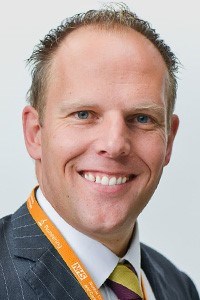I am the deputy chief executive of Norfolk Community Health and Care. As a community NHS trust we provide a broad range of services from helping children and their families get off to the best possible start in life all the way through to specialist end of life care. In between, our services cover caring for frail elderly housebound patients, providing care on inpatient units, including a regional and specialist rehabilitation centre, as well as supporting those with learning disabilities. Our staff work from multiple sites and over a very large geographical area with multiple and diverse partner organisations.
The current pandemic has of course brought challenges to how community care is delivered and has tragically affected many of us. It has highlighted the fragility of delivering care through small and remote teams, sometimes invisible to the wider population unless they are accessing the services themselves. Community care doesn’t have the public visibility of a large hospital or a blaring ambulance siren. But our staff have been there for our patients. Implementing infection control and personal protective equipment (PPE) use in people’s homes; advocating for the needs of autistic children impacted by restricted access to shops for the only brand of beans that they will eat; establishing new discharge pathways to support capacity in our acute hospitals; and mobilising rapidly changing testing services for staff, keyworkers, the public, and care homes.
We have seen the benefit of previously laid foundations, which have helped us respond as well as develop further. Going into the last few months we had good digital maturity and that has enabled us to flex how care is delivered and how remote teams function. But like many organisations, the last few months has provided the opportunity to accelerate what we were already doing. We have implemented further remote patient contacts, been able to run our Incident Control Centre virtually and provide single points of access remotely. We’ve implemented an app to give our staff access to MyESR, our rostering systems, as well as internal briefings such as vlogs, health and wellbeing resources and blogs. Community staff have embraced remote video handovers and coffee breaks from wherever they are. We’ve seen better internal collaboration.
The pandemic has also accelerated external collaboration. At an organisational level local partners have come together to plan and manage additional capacity or co-ordinate PPE supplies.
Deputy chief executive and director of strategy and transformation
The pandemic has also accelerated external collaboration. At an organisational level local partners have come together to plan and manage additional capacity or co-ordinate PPE supplies. Relationships between leaders have deepened through more regular contact and shared support. Importantly this has also been the case in Primary Care Networks. For example, we have seen experienced General Practice Nurses and GPs working jointly in one of our Community Hubs with the community team. This has resulted in better information sharing between the community and general practice teams, better coordination of care, time released for the community team, and identification of areas for further improvement.
Patient need has also prompted new partnerships and services, for example our Integrated Recovery Planning in West Norfolk. We sought to be proactive around caring for those recovering from COVID-19. There was a need for multiagency/multidisciplinary discussion about the varied symptoms and concerns that these patients were experiencing. Our overall aim was to coordinate, to collaborate, and to integrate for good and safe care. This would ensure patients had timely, appropriate and holistic assessments in order to create an individualised care plan. Staff were supported to learn, develop and reflect on new ways of working and alternative ways of delivering care across Norfolk. This partnership included ourselves, Norfolk County Council, Norfolk and Suffolk Foundation Trust, The Queen Elizabeth Hospital Foundation Trust, Norfolk and Norwich University Hospital Foundation Trust, BOC (Provider of medical gases), commissioners and a local hospice.
We need to continue to give freedom and power to frontline staff and their local leaders to make a difference to the communities to whom, without doubt, they are the closest.
Deputy chief executive and director of strategy and transformation
The future will bring some familiar and some new leadership challenges. As a community trust we have been able to draw on the benefits of scale providing infrastructure and support, rapidly responding to need whilst being locally responsive. We need to continue to give freedom and power to frontline staff and their local leaders to make a difference to the communities to whom, without doubt, they are the closest. This includes guarding against the tendency to re-introduce bureaucracy and process that might now slow down and restrict the increased autonomy, innovation and flexibility of the last few months. The remaining barriers between organisations that have collapsed with pace in the face of a common crisis and cause, need to continue to disintegrate as we move towards becoming an Integrated Care System, and support the maturing of our Primary Care Networks.
Finally, there is the opportunity to strengthen the narrative around care for our local populations. COVID-19 has given us common purpose and impetus. As we adjust to our new reality, we need to replace that with one centred around our communities and the delivery of seamless, integrated care.
About the author

